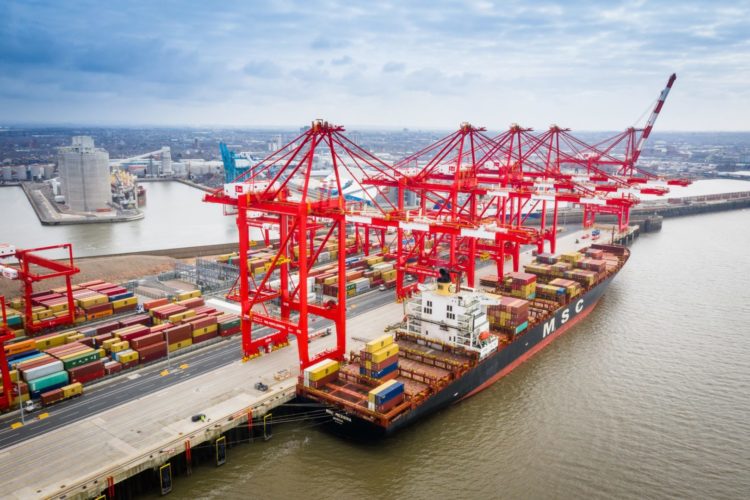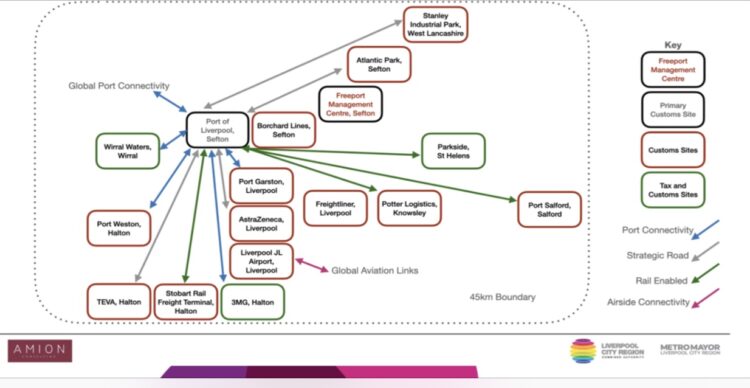Hydrogen lorries to serve Liverpool City Region Freeport
A fleet of hydrogen-powered lorries carrying freight around the Liverpool city region is one of the many proposals for the new Freeport which is expected to go live in spring 2022.

The Port of Liverpool will be just one of multiple Freeport locations
A fleet of zero emission hydrogen-powered lorries will carry freight between the multiple sites of the new Liverpool city region Freeport zone.
In an interview with LBN, Freeport director John Lucy said the push towards net zero carbon emissions would be “at the heart” of the Freeport which he expects to start operating from spring 2022.
Mr Lucy, who is employed by the Liverpool City Region Combined Authority to oversee the implementation of the Freeport, also said its proposals were already appearing on the radar of potential international investors.
“There are around 2,800 freeport zones already in operation around the world,” said Mr Lucy. “So global investors are familiar with the concept and we are already starting to get a lot of International enquiries.”
In March 2021, Chancellor Rishi Sunak announced that Liverpool city region would be one of eight new English Freeport zones. They are Thames, Solent, East Midlands, Freeport East (Felixstowe and Harwich), Plymouth and South Devon, Humber and Teeside. It is expected more Freeport locations will be revealed at a later date.
A flagship policy in the Conservative’s 2019 election manifesto, Freeports are designated zones where normal tax and customs rules do not apply. These can be airports or other hubs as well as maritime ports. At a Freeport, imports can enter with simplified customs documentation and without paying tariffs.
There are some 80 Freeports or free zones within the EU and, until 2012, Britain had seven Freeports, including one at the Port of Liverpool. However, unlike the previous incarnation, Liverpool city region’s new Freeport will have a much bigger geographical footprint, covering multiple locations.
These include the Port of Liverpool, Wirral Waters, Liverpool John Lennon Airport, logistics sites in Knowsley, Sefton, St Helens and West Lancs and the Stobart rail freight terminal in Halton.
When the news was announced in March, it was enthusiastically welcomed by the partners in Merseyside who were behind the bid. These included the Liverpool City Region Local Enterprise Partnership, industry body Mersey Maritime and Port of Liverpool and Wirral Waters owner Peel Group.
They estimate a Freeport could boost the city region’s GVA by £850m and help to create 14,000 new jobs. Mr Lucy, who took up his role on November 1, said the buy-in of the city region’s public and private sectors would be critical to the success of the project.
He explained: “This has been a huge logistical exercise for the Combined Authority. It would have been easy to make this just about the port. But what we are proposing is far more ambitious than that.
“All the six local authorities are now on board with what we want to do, as are key stakeholders in the private sector. And it is not just about engaging with the business community but with the wider community as well. There is lots of good work going on in terms of the whole city region – new jobs, new skills, investment in green technology.”
Liverpool City Region submitted its outline business case for the Freeport to the Government in November and that has now been approved. It will submit a further detailed business case by mid-April. In line with the other English Freeport zones it will expect initial funding of £25m to kick-start the project.
Shortly after that Mr Lucy expects the first tax and customs site to go live. Several locations are under consideration. It could be the Port of Liverpool at Seaforth or perhaps Wirral Waters or Liverpool John Lennon Airport. An announcement is expected early in the New Year.

Locations covered by the Liverpool city region Freeport
Metro Mayor Steve Rotherham has said he intends for the city region region to lead the way in the push towards net zero carbon. He has signed up to the multi-billion pound Hynet project which will see hydrogen production start in 2025, supplying clean energy to industries across the North West, with carbon captured and stored under Liverpool Bay.
Hynet will play a key role in the Freeport plan and Mr Lucy told LBN that one of the proposals was to have a fleet of hydrogen-powered lorries carrying freight between the multiple Freeport locations. This is similar to the Metro Mayor’s plan for a new fleet of hydrogen buses which is already well advanced.
He said: “We want to see more freight moving in and out of the city region but we don’t want that to mean more pollution. The push towards zero carbon is at the heart of what we are proposing to do. We want the Freeport to accelerate that development.
“There is already a lot of work going on. And it is important to point out that this is a long-term project. We are looking at five to 15 years before we start seeing the full benefits of the Freeport.”
For more on Liverpool City Region’s Maritime and Logistics sector click HERE.
